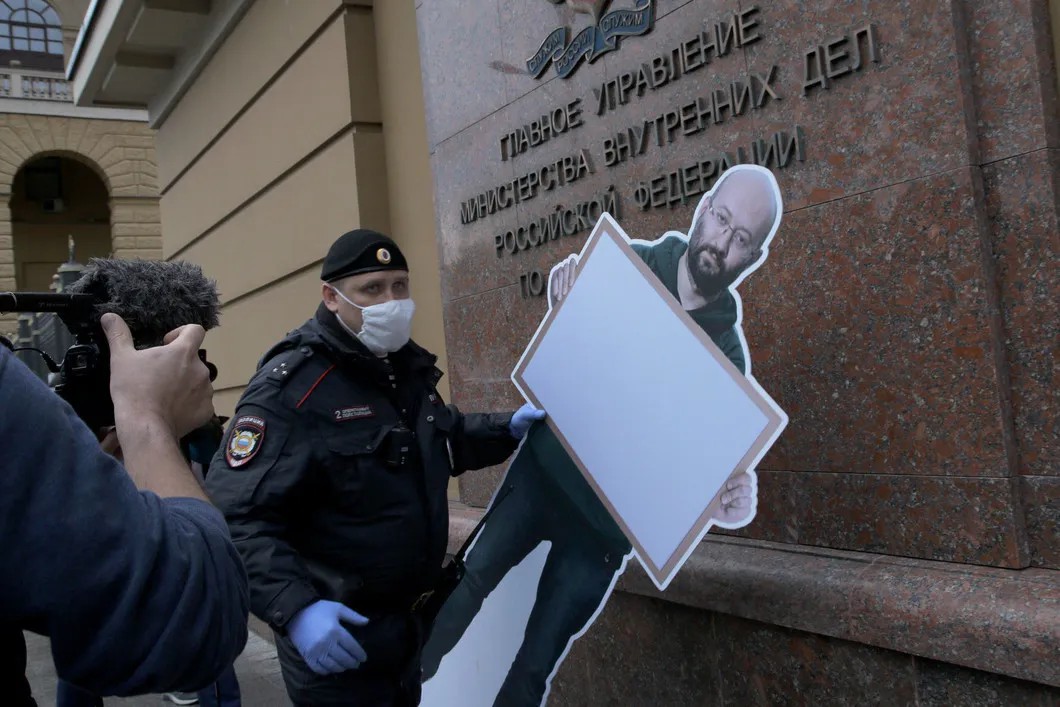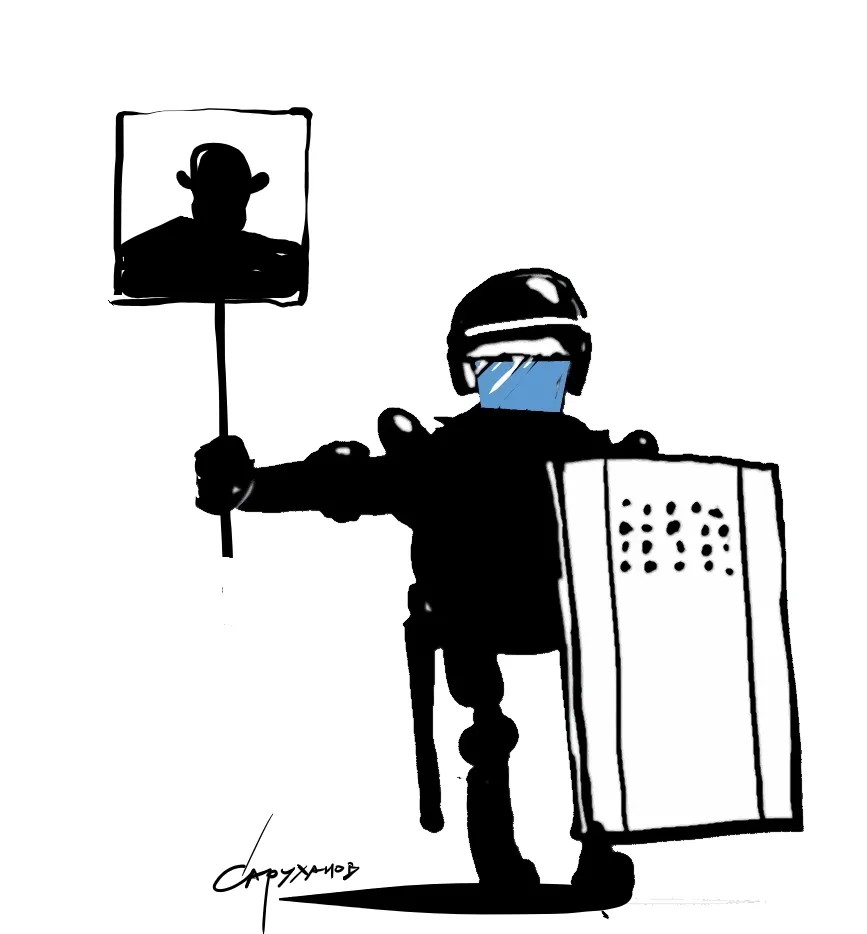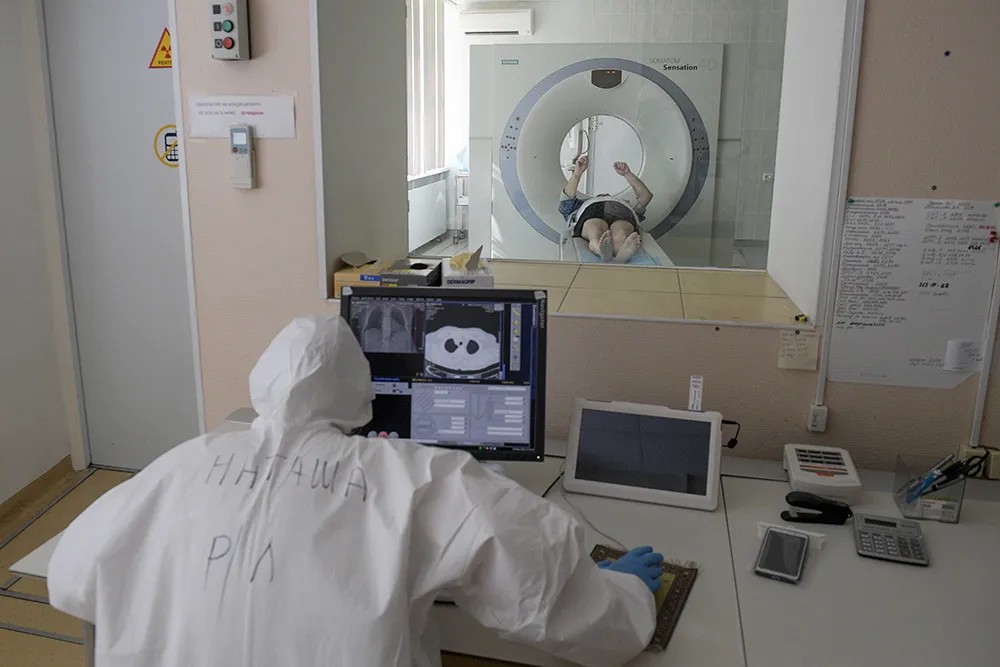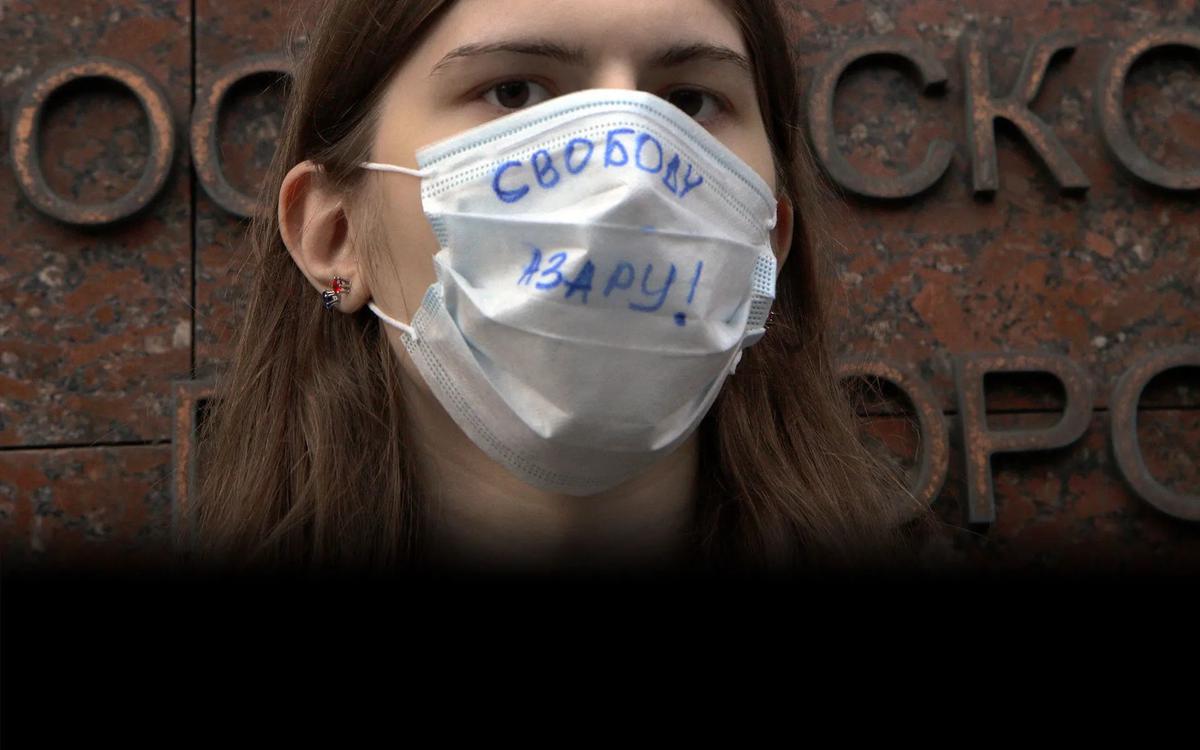This Week’s Highlights
We look at how the arrest of our journalist Ilya Azar has backfired on Russian law enforcement authorities and provoked even more protests; Trump suggesting bleach injections is more Russian than you might think; we bring you more stories of officials evicting Crimeans from their homes; plus, Covid-19 helps to bring the golden era of Russian gas to the end.
Want to get the full story? Click the links below for full-length articles in Russian.
The Arrest Of Ilya Azar, Explained
Russia is experiencing one of the largest waves of mass arrests in months. It started last week with the detention of our journalist and municipal deputy Ilya Azar for peacefully protesting against law-enforcement overreach. The arrest provoked a wave of solidarity protests that met, as usual, a police crackdown.
What happened to our journalist after the arrest.Azar is now serving 15 days in jail. His arrest is whitewashed with Moscow’s Covid-19 lockdown regime and the ban on public gatherings, even though the journalist was doing a peaceful, one-person demonstration.
Why Russians are protesting.Azar was expressing public solidarity with two arrested Russian activists Viktor Nemytov and Vladimir Vorontsov. They are behind a popular Telegram channel ‘Police Ombudsman’ exposing police brutality. The arrest of our journalist provoked solo pickets around the capital, leading to detentions of dozens. Among them was a cardboard cutout of Azar — one of many placed around the city as part of the protests.

But, why Russians are protesting, really. The ongoing outburst of public discontent by the Russian civil society is a part of broader frustration with President Putin’s ongoing power grab. It is fueled by the worsening economic crisis, botched pandemic response, and leftover anger from the last mass wave of repressions following rigged local elections last year.
This is not the first time Azar provokes an uprising.When exactly a year ago another Russian investigative journalist Ivan Golunov was detained on bogus drug charges, Azar went out to picket in solidarity, thousands followed. It seems law enforcement authorities thought that while the country is preoccupied with a pandemic it would be a good time to carry out their revenge plot, our political editor Kirill Martynov explains.
Don’t mess with Russian independent journalists.According to Martynov, much like last year, when law enforcement authorities accidentally provoked a surge of solidarity around Golunov and gaslighted protests over rigged local elections, it seems they unwittingly inflamed this situation, too. Azar’s arrest not only sparked solidarity pickets but garnered international attention, triggering further political discontent at a time when Putin needs a boost of public support. His trust ratings hit 25% last month — an absolute low for his two-decade rule.
Read Kirill Martynov’s full piece on how security officials are tanking Putin’s rating here.

Russia’s Covid-19 Crisis, Explained
More than 400,000 Covid-19 cases are recorded across the country as thousands of new infections continue to emerge daily. But Russia is determined to reopen the country nonetheless. For both state and citizens alike, it’s unaffordable to stay quarantined. Moreover, the crisis is plunging Russians further into debt.
Even before the outbreak, the country had a growing household debt problem.In the last four years, it has risen by a third as incomes kept falling amid poorly regulated lending practices. This week we brought to light the stories of victims of Russian loan sharks. Natalia Barinova became a target after borrowing 7000 rubles (about $150) to run her cosmetics store. Despite having paid off the amount several times in interest, the collectors kept coming after her, even when her business went bankrupt.
“The collectors constantly called, even at night,” said Barinova, who now owns the microloan company, an unexplained sum of 147,900 rubles (around $3120). “They were interested in my health, they asked if I was alive. They said they could give me a funeral wreath.”
The situation has deteriorated amid the pandemic. Dmitry Prokhorov, a lawyer and founder of an online group helping borrowers, says collectors would come to your home and graffiti insults and vandalize your building. In some cases, they would call up their families and colleagues, pretending to be state employees to discredit them. According to Prokhorov observations, the number of people who are unable to repay their loans has doubled.

“People will be borrowing money for lawyers and to live. At the same time, they will be borrowing more because they would have consumed all their savings during the crisis and been left without work,” says Prokhorov.
Поддержите
нашу работу!
Нажимая кнопку «Стать соучастником»,
я принимаю условия и подтверждаю свое гражданство РФ
Если у вас есть вопросы, пишите [email protected] или звоните:
+7 (929) 612-03-68
Meanwhile, Russian hospitals aren’t coping with the reopening.Some two weeks after Russia began lifting quarantine measures, hospitals in St. Petersburg, the country’s second most infected city, are finding themselves strapped for beds and resources. Lines of ambulances have formed around hospital buildings, in scenes similar to those at the onset of the pandemic. Back then, the problem was the absence of Covid-19 hospitals. Now, these hospitals are running out of space.
“This is a nightmare.” This week we report from a local Pokrovsky hospital. There are already 665 infected patients with a total capacity of 646. Despite this, ambulances continue to bring in patients because the situation in all of the 23 Covid-19 dedicated hospitals in St Petersburg is the same.
“We have run out of beds and blankets, pillows, and bed linen for patients,” said one doctor. “This is a nightmare. In some corridors, there is nowhere to put the trestle beds, you can’t even get through. 43 patients are sharing 35 beds in the intensive care unit.”
Trump suggesting bleach injections is more Russian than you might think.Similarly to the US president, Russian medics are engulfed with antiquated scientific beliefs, warns in this week’s op-ed doctor and professor of medicine, Yaroslav Ashikhmin. Many Russians doctors suffer from the ‘mystified’ Covid-19 perspective, writing off coronavirus deaths as fate and proposing helium as a treatment. At the same time, the gap between Western and Russian medical technologies keeps growing. The crisis is rooted in the multi-decade culture of prioritizing individual methods over peer-reviewed clinical trials and evidence-based medicine, Ashikhmin thinks.
Finally, a cat-astrophy in Moscow.A Russian cat has been placed under quarantine after becoming the first feline to test positive for coronavirus in the country. It’s unknown whether her owner has Covid-19, but experts say there is no evidence that pets are spreading the infection to humans. Veterinarians also don’t know whether animals can become ill as a result of exposure to the coronavirus. There have been several similar incidents internationally, including in a Belgium cat and two New York mousers.
Read the full piece on how microloan companies and collectors work in a pandemic here and the situation in St. Petersburg hospitals here.
Covid-19 Arrests ‘Golden Age’ of Russian Gas
The Great Shutdown helped to kill Russia's key deal for gas export. With Europe prioritizing 'green energy,' Russia's state gas giant and the country's top revenue source Gazprom (5% of GDP in 2018) faces a bleak future faster than the Kremlin feared.
Covid-19 vs. Russian gas dominance.Last month, a 25-year gas contract expired, which helped bring around 15% of Russian gas to Europe via the Yamal-Europe pipeline with Poland as the entrance point. The Polish government is not interested in renewing it. The Great Shutdown and slump in gas demand allowed Europeans to accelerate on the path to energy independence and distance themselves further from a reliance on the Russian gas that often comes with political strings attached.
Covid-19 vs. Russian gas price.Contracting economic activity and a mild winter have impacted gas demand, which has already fallen in Europe by 5% — the largest decline in the second half of the twentieth century. Some traders predict that building up oversupply could drive prices into the negative. Our economy editor Arnold Khachaturov says Gazprom has been selling gas at a loss since the start of the year. "In the first quarter, the state company has already lost over $4 billion," he says.
"Cheap liquefied natural gas is gradually depriving Gazprom of key sales markets. Poland and Turkey have already begun to abandon long-term contracts with the Russian monopolist. And Gazprom will never return the previous negotiating power, which allowed the company to dictate its prices over the last two decades," Khachaturov predicts.

The future is grim.According to the market estimates, Gazprom needs to sell its gas at a minimum of $100 per thousand cubic meters to stay above the water. The market price for Russian gas is $45.8 now. The state gas giant can only hope for a relatively quick economic recovery in Europe and a colder winter next year.
Backstory.The Kremlin has a history of using gas and oil supplies for geopolitical pressure. Russia has previously cut off supplies to Europe amid confrontations with unfriendly governments in Ukraine and recently cut oil sales to Belarus by 40% after Minsk demanded a fair contract. The ongoing construction of the Nord Stream II pipeline that will bring Russian gas to the EU bypassing the usual route through Ukraine faced international opposition. Critics fear it will become an instrument of geopolitical blackmail — the accusation that the Kremlin denies.
Read the full story about how the Covid-19 crisis has affected the gas market and Gazpromhere.
Other Top-Stories Russia Has Been Reading
- This week our readers were captivated by the story about Russia’s most autocratic regional leader Ramzan Kadyrov of Chechnya falling ill with Covid-19 and the bizarre way it got exposed. As the first reports of the illness emerged, the Chechen authorities denied it. The region’s health minister Elkhan Suleymanov, who got infected with Kadyrov, went as far as staging a video of himself in a hazmat suit, claiming to be busy working with Covid-19 patients. Journalists cross-checked the filmed decor and spotted the identical at the presidential hospital in Moscow. It later turned out, both Chechen officials were hospitalized there. Before getting sick, Kadyrov launched the country’s most repressive campaign against coronavirus-positive folks — it was exposed by our investigative reporter Elena Milashina.
- Evicted in the middle of a pandemic.Earlier, we brought you stories of several families facing eviction in Crimea. This week, our correspondent Ekaterina Reznikova spoke with the Ablaev family, who ended up on the street after refusing to sell their Crimean home to a highway construction project. Authorities decided they needed the Ablaev family home in the village of Privetnoe to build a four-lane highway that would connect the cities of Kerch and Sevastopol. In exchange, they offered the family $30,000. The Ablaevs say at that price they could only afford a place without gas, water, and an indoor toilet — below their current living standards. The authorities seized their land by force, and the family was thrown out onto the street amid the quarantine.
Thanks for reading!To keep up with Novaya Gazeta’s reporting throughout the week, you can follow us on Facebook, Twitter, Instagram, and Telegram. Our video content is available on Youtube and don’t forget to visit our website for the latest stories in Russian.
— The Novaya Gazeta Team
Поддержите
нашу работу!
Нажимая кнопку «Стать соучастником»,
я принимаю условия и подтверждаю свое гражданство РФ
Если у вас есть вопросы, пишите [email protected] или звоните:
+7 (929) 612-03-68
